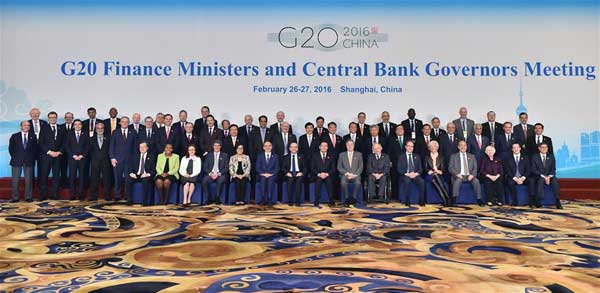Year of scopes and tests for world powers
Updated: 2016-03-06 08:54
By Zhu Feng(China Daily)
|
|||||||||
 |
|
Officials pose for a family photo at the G20 Finance Ministers and Central Bank Governors Meeting at the Pudong Shangri-la Hotel in Shanghai, East China, Feb 27, 2016. [Photo/Xinhua] |
This is going to be an eventful year for international politics. Aside from the sluggish global economic growth, major economies also have a lot to deal with at home. The controversial US Republican presidential candidate Donald Trump is one step closer to winning his party's nomination race, adding more uncertainties to the country's presidential election. Tensions still run high in the Middle East, while Russia is yet to reconcile with the West over the Syrian and Ukrainian crises.
The process of denuclearizing the Korean Peninsula, too, has hit speed bumps after the Democratic People's Republic of Korea conducted its fourth nuclear test on Jan 6 and launched an Earth-observation satellite on Feb 7.
More importantly, for major global powers, whether they are able to mobilize enough international support to fight cross-border terrorism led by the Islamic State, will serve as a barometer of their capability to fruitfully handle their relationships.
Defined as modern countries that have systematic impact on the international systems, major powers including the United States and China, are obliged to shoulder greater responsibilities and play a more active role in regional and global affairs. And to safeguard global peace, stability and prosperity, they need to closely cooperate and coordinate by shelving their differences and disagreements.
High hopes have been placed on China's diplomatic performance this year, as President Xi Jinping is expected to inject fresh momentum into the "major country diplomacy with Chinese characteristics".
Regardless of their geo-economic and geopolitical disparities, however, major powers should adhere to the principles of non-conflict and non-confrontation. In particular, they should jointly address outstanding global issues through effective communication and dialogue. There is enough room for cooperation among major powers when it comes to nuclear non-proliferation, reducing carbon emission and boosting global growth, which largely depends on concerted financial policies of all economies.
Related Stories
Wang: China-US maritime cooperation possible 2016-03-08 11:44
Xi extends best wishes for China-US Year of Tourism 2016-03-01 16:22
China, US work together to police sea 2016-02-18 08:30
TPP has slight negative impact on China: US think tank 2016-02-16 22:08
China,US advance cooperation 2016-01-28 03:00
China-US nonstops easing connections 2016-01-11 07:45
Today's Top News
Inspectors to cover all of military
Britons embrace 'Super Thursday' elections
Campaign spreads Chinese cooking in the UK
Trump to aim all guns at Hillary Clinton
Labour set to take London after bitter campaign
Labour candidate favourite for London mayor
Fossil footprints bring dinosaurs to life
Buffett optimistic on China's economic transition
Hot Topics
Lunar probe , China growth forecasts, Emission rules get tougher, China seen through 'colored lens', International board,
Editor's Picks

|

|

|

|

|

|







